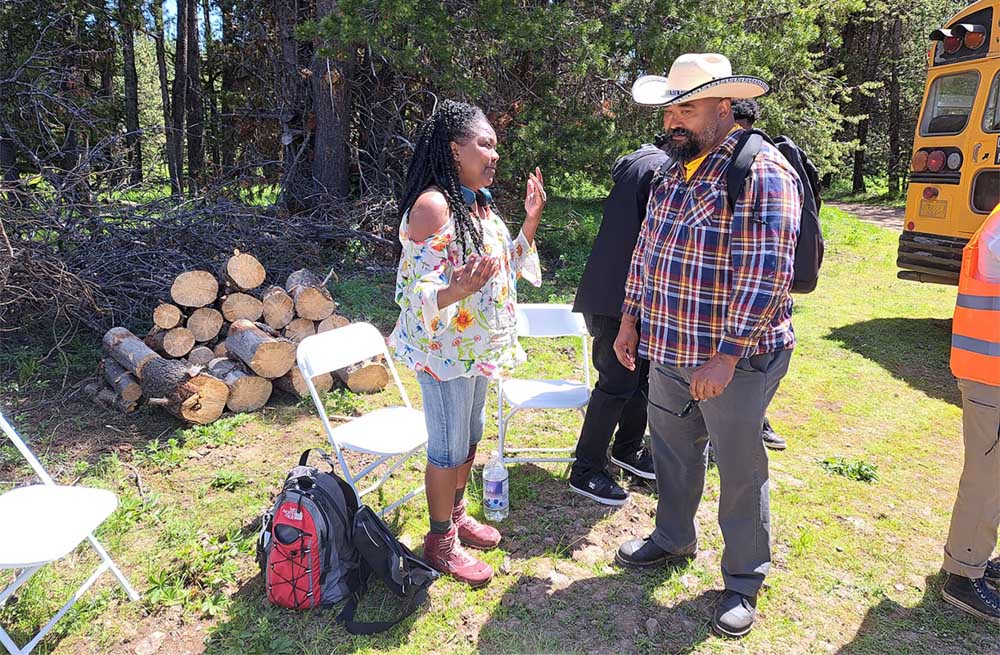Maxville milestone: Historic logging community celebrates its centennial
Published 6:00 am Wednesday, June 7, 2023

- Gwen Trice, the executive director of the Maxville Heritage Interpretive Center, speaks with a participant in Maxville's centennial celebration on Friday, June 2, 2023.
MAXVILLE — Maxville, the historic site where Black and white loggers worked side-by-side a century ago, celebrated its centennial Friday and Saturday, June 2-3, with music, food, speakers and activities designed to celebrate and honor the accomplishments and work of a group of people who had a vision and wanted to bring that vision to fruition.
In her opening remarks Friday, Gwen Trice, the executive director of the Maxville Heritage Interpretive Center, greeted everyone by saying, “I’m privileged and honored to be in this space with each and every one of you.”
She said people hear a lot today about changing borders and separateness. She swept her arm over the crowd and said, “This is what it looks like to be inclusive.” She went on to acknowledge the help of all the volunteers, sponsors and community organizations who helped make the event possible.
Trice concluded by saying, “if you’re wearing socks, take ‘em off — cuz we’re gonna knock ‘em off!”
The theme of inclusion carried over to the artists who performed on Friday. Maxville has strong collaborative ties with the Nez Perce (Nimi’ipuu, pronounced Nee-Me-Poo) Tribe, and so Trice introduced Aaron Miles Sr., who works in natural resources for the tribe. Before introducing Lightning Creek, a drumming group from the tribe’s reservation in Lapwai, Idaho, comprised of two fathers and their sons, Miles said, “we’re all different people and this is what this place is about.” The drumming group performed several native songs.
Trice has family connections to Maxville, but she didn’t initially know that her family had been recruited to Oregon from Arkansas to be loggers during the mid-1920s. Trice said she also was unaware of the exclusionary laws in Oregon that prevented Black people from owning property or businesses.
When Trice came to Oregon and uncovered her history, she said she knew she had to tell the story — in the most inclusive way possible.
“We have an opportunity for a space we’re building upon,” she said.
The Maxville site had an administrative building, two schoolhouses (one for white children and the other for Black children) a baseball diamond, a church and a general store on its 240-acre parcel, located outside Wallowa.
The Interpretive Center has owned the Maxville site since June 2022. Trice said the organization is trying to be good neighbors with good policies concerning wildfire management and protecting and supporting its space. The Maxville site is also a designated archaeological site and has been nominated for a historical site designation.
Long-term plans for Maxville include continued stewardship of the land, a new foundation for the old lodge, which served as an administration building, restoring the baseball diamond and restoring the sites which were originally used as schoolhouses.
Trice said the site will be on the National Register of Historic Places by the end of the year and will be included in the rural sites of African American properties.
The biggest sponsor of the project is the Smithsonian, with its “Our Shared Future: Reckoning with Our Racial Past” initiative.
A highlight of the activities included a reading of a proclamation from Oregon Gov. Tina Kotek, designating June 3 as Maxville Heritage Day, and honoring the significance of the role Black loggers played in Oregon’s history. There also is a flag at the Maxville site that was flown over the U.S. Capitol.
When asked what she wanted people to take away from the celebration, and the work of the Maxville Heritage project, Trice said she wanted people to be inclusive, and to be a vehicle to lift up the voices of the community. She said people have differences in community, and differences from rural to urban settings, but said Maxville is working to bridge the gap and that people need to be willing to have a conversation about their differences.
Following Trice’s opening remarks, a song was sung in her honor, for the 15 years she has dedicated to the Maxville project. Two lines of the song go like this: “Let the work I do speak for me. Let the life I lived speak for me.”





